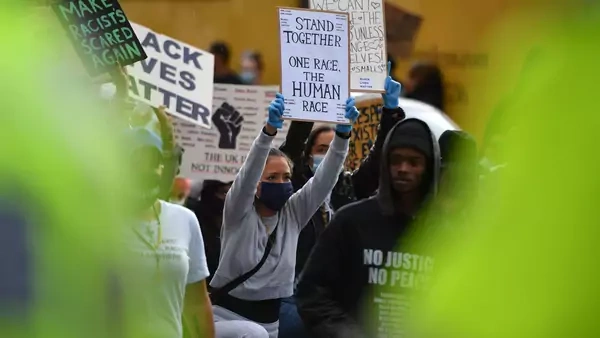
rotesters hold up placards as they “take a knee” in front of a police line at a Black Lives Matter demonstration outside the U.S. Embassy in London on June 7, 2020, during a weekend of global rallies against racism and police brutality. Justin Tallis/AFP v @CFR_org
Insufficient leadership, outdated curricula, and alienating school climates leave future foreign policy experts ill prepared to address the social forces contributing to fragility and unrest globally. Transforming U.S. foreign policy requires a comprehensive educational strategy on diversity, equity, and inclusion.
Introduction
Diversity, equity, and inclusion issues are among the United States’ greatest leadership challenges. America faces profound societal fissures at home, even as there are similar diversity challenges around the world. The U.S. government’s underestimation of the import of growing inequality and exclusion is resulting in destabilization, creating security risks, and damaging U.S. interests.
International affairs schools help shape the next generation of national security leaders, but they risk contributing to America’s continued vulnerability by failing to address the security implications of diversity, equity, and inclusion issues at home and abroad.
A lack of school leadership, outdated curricula, and alienating school climates leave future foreign policy experts ill prepared to confront how the United States’ inequalities currently undercut its standing in the world and unable to effectively address the social forces shaping fragility and unrest globally.
Fortunately, over the past two years, there has been some progress in international affairs education, supported by dozens of deans from Harvard University, Princeton University, Columbia University, and beyond.
Positive steps include a diversity and inclusion standard in the accreditation process for public policy schools, the launch of certification programs focused on gender issues in foreign policy, and—in response to the anti-racism protests of 2020—the inclusion of courses focused on race and racism in curricula. But more work needs to be done to ensure that schools of international affairs and public policy prepare the next generation of leaders to meet contemporary challenges head on.
